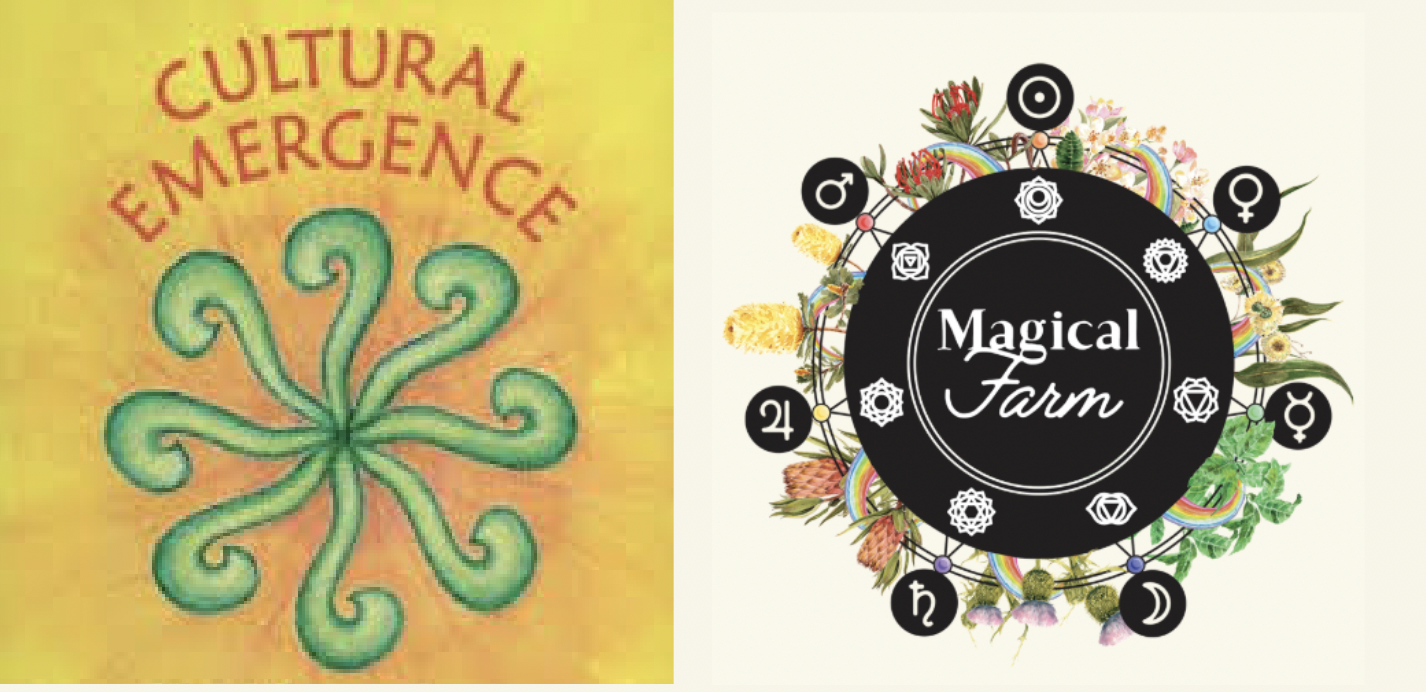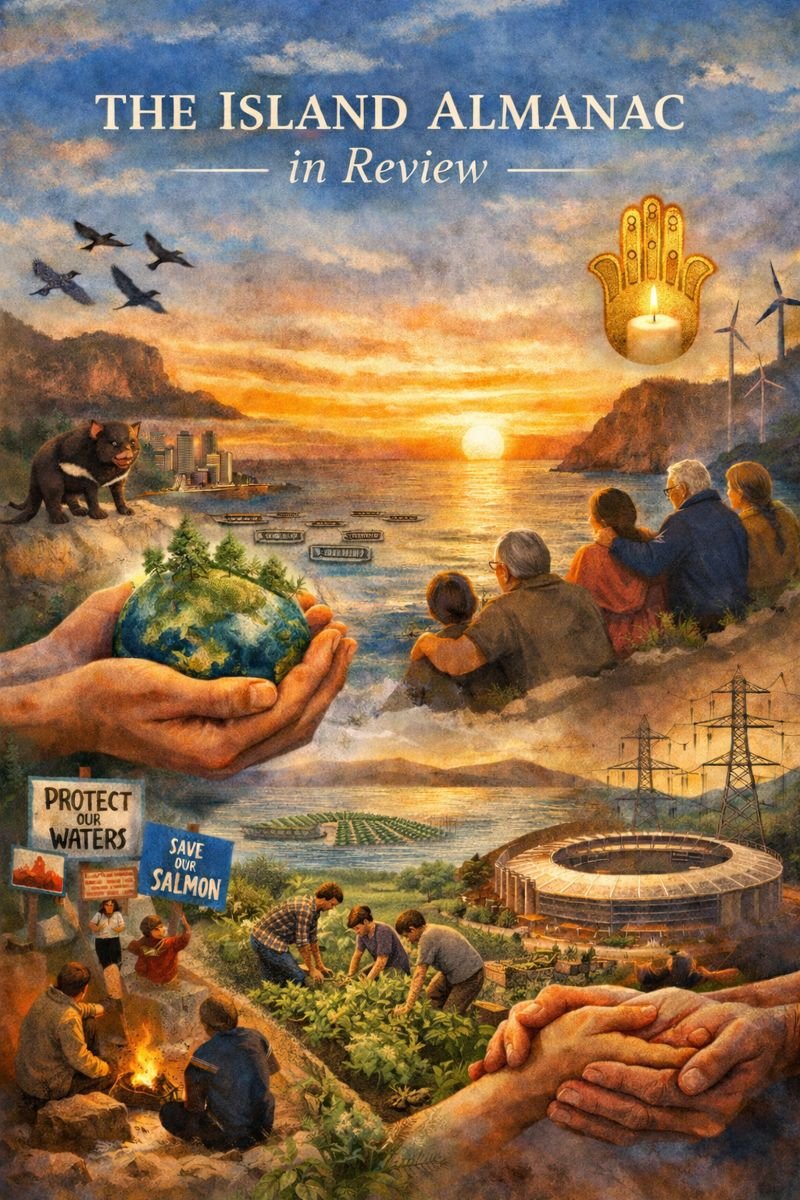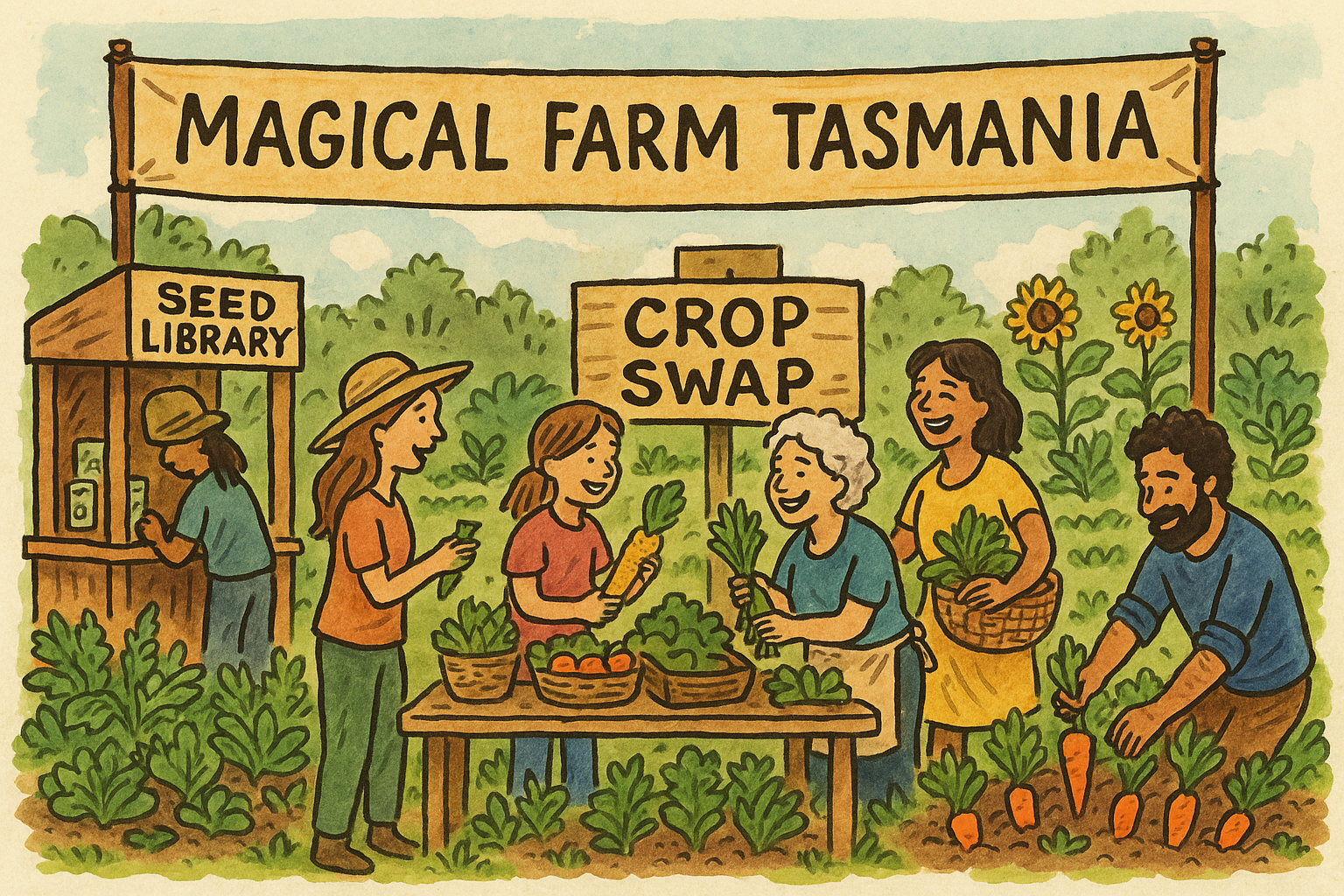“We weave ideas, scribe forward, align with life and create connection.”
— Dr Demeter | Emily Samuels-Ballantyne
Covering topics on Foundational Economics, Convivial Governance, Anthroposophic Philosophy & Everyday Regeneration in Tasmania
Overview
The Island Almanac is a living compendium of stories, tools and place-based examples that weave together foundational economics, anthroposophic wisdom and the rhythms of everyday life. Rooted in the soils of Tasmania and flowering from Magical Farm Tasmania. Across its pages you’ll find:
Practical essays on redirecting public and private wealth into community resilience
Anthroposophical reflections on seasonal rhythms, ritual and soul-led innovation
Tasmanian case studies from coastal hamlets to mountain valleys
Project spotlights on island-wide initiatives, from seed libraries to solar co-ops.
Living Architecture: A dynamic framework of interconnected practices, food, housing, energy, governance, culture, activism and economics that grows, adapts and breathes like an ecosystem, rather than standing as static policy or infrastructure. These seven pillars form the Living Architecture of Regen Era Design Studio & The Island Almanac: integrating heart, head & hands to power a truly regenerative future.
Food, Plants and Planets
Housing and Natural Building
Energy
Community Life, Learning & Culture
Sacred Activism
Convivial Governance
Regenerative Economic Design.
Cultural Emergence at Magical Farm Tasmania Sunday January 18th 2026
Cultural Emergence at Magical Farm on Sunday 18th Jan 2026 is an invitation into a different kind of change-making, one that treats culture as a living system shaped by what we practice repeatedly, not just what we believe or argue about. Blending social permaculture, breathwork, forest therapy, and practical life-design tools, the workshop offers a grounded day of re-patterning attention toward what grows trust, resilience, and real belonging. It’s for anyone feeling the strain of our times and craving a space that can hold complexity without hardening, where ecological intelligence becomes embodied, relational, and replicable, and where hope is practiced into existence together.
A Year of Reweaving: Notes from The Island Almanac, 2025
In 2025, The Island Almanac became a living record of a place under pressure, and a steady refusal to let pressure collapse us into binary thinking. Moving through the year’s rupture-points (from public grief and violence to contested megaprojects, salmon industry harms, energy transition conflict, and the quiet intensity of a widening mental health crisis), the writing traced a deeper pattern: when systems harden, people harden too, unless we deliberately rebuild the village layer of life, relationship, meaning, practical competence, and shared care.
Across essays on convivial governance, foundational economics, regenerative culture, and what I call Ecological Mind Activism, the Almanac argued for a shift from activism as constant alarm to activism as ecological intelligence, measuring effectiveness not only by what we oppose, but by what we can grow: real alternatives, replicable practices, and everyday lives less dependent on extraction. At its heart, this body of work offers a new narrative for Tasmania: not a fight for the “right side,” but a practice of reweaving, where grief becomes a doorway to repair, conflict becomes a catalyst for better containers, and the future becomes something we build together, one living pattern at a time.
Ecological Mind Activism
This article challenges the dominant narrative of environmental activism by reframing the krill crisis through the deeper lens of food systems, ecological identity and regenerative community practice. It argues that industrial krill extraction is not only an oceanic tragedy, but a symptom of depleted soils, hollow food cultures and lifestyles disconnected from place. Drawing on Tasmanian case studies and place-based scenarios, the piece offers an imaginal pathway where nutrient-dense local foods, herbal traditions, community renewal schemes and land-sea reciprocity dissolve the demand for krill-based supplements altogether.
The article critiques the performative tendencies of modern activism: the adrenaline, spectacle and “thrill to save krill” and calls for a new paradigm grounded in slowness, competence and systemic cultivation. Integrating Freya Matthews’ ecological self theory with the author’s Convivial Self theory, it introduces Ecological Mind Activism: an approach where activists embody the ecological mind while practicing the convivial skills needed to regenerate community systems, redirect public funds toward life-enhancing projects and rebuild local food autonomy.
Through the work of Regen Era Design Studio, the article demonstrates how these principles can be applied in real places, offering practical tools for moving beyond resistance into renewal. Ultimately, it argues that environmental action must evolve from fighting extraction to cultivating the cultural and ecological conditions that render extraction unnecessary, inviting a shift from performance to praxis, from urgency to attunement, and from crisis to regeneration.
Scenario Two Returns: A People’s Stadium for Tasmania
Tasmania is being asked to accept another top-down, corporate megaproject—this time a stadium shaped more by AFL interests than community wellbeing. Drawing on the legacy of Scenario Two – Powering Regeneration, this article offers seven alternative visions rooted in Designing with Country, justice, imagination and local place-making. These scenarios show how investing outside Hobart’s CBD, into Glenorchy, Bridgewater/Gagebrook, Shorewell Park, Risdon Vale or a retrofit on the outskirts, creates regeneration rather than displacement. First Nations leadership, diverse sports, food-growing, arts, youth programs and wellbeing ecosystems become the real legacy. Scenario Two reclaims public investment for the highest good of all Tasmanian’s, proving a stadium can uplift rather than extract.
Tarkind: Painting a Living World Back Into View
Life works in relationships. Tarkind invites people to feel that truth in place. Born in 2022 from a mum and son, a field biologist, and a palawa artist, our Hobart-based collective weaves science, story, and art so care becomes culture. Inspired by living-systems thinking (Capra) and design for regeneration (Wahl), we walk and notice with iNaturalist, paint what we find so the insight lands, then plant and repair so places grow more resilient. This head, heart, and hand practice, echoed by Orr and Satish Kumar, builds tolerance, everyday care, and quiet reverence. We partner with the Great Southern BioBlitz each spring. Join us Sunday 26 October 2025 at Magical Farm and Allens Rivulet. Bring curiosity, a notebook or phone, and something to paint on.
From Clash to Pattern: A Living Systems Guide
Dr Emily Samuels-Ballantyne argues that communities don’t fail because people disagree; they fail when disagreement has nowhere useful to go. Drawing on Con Viv (head–heart–hand alignment), Jung’s idea of the “Third,” and Anthroposophy’s threefold social order, she reframes conflict as a constant input that can be metabolised into capacity. The article outlines practical containers, listening spaces that surface facts, rights processes with visible decision rhythms, and small, time-boxed pilot projects, that turn heat into shared work. Rather than “being nicer,” it proposes love as infrastructure: clear lanes between cultural freedom, equal rights, and mutual economy, plus simple cycles of notice → propose → trial → review. The result is a pattern language for civic care where friction becomes fuel and culture grows through practice.
Stop Funding PDFs. Start Funding Patterns.
This essay argues that Australia’s resilience work is over-documented and under-practiced. Drawing on a database of thousands of local food policies and current state/federal funding streams, it proposes a shift from writing strategies to funding “patterns”: small, hosted experiments that turn one policy clause into a safe, repeatable practice, seed libraries and crop-swaps, cool-evening street meals with tree-watering rosters, neighbourhood preparedness walk-throughs, and similar low-overhead trials. Framed by Con Viv (“with life”) and threefold social theory, the piece outlines how councils and communities can run micro-trials with clear edges, light measures, and a one-page “how we did it” so others can copy. It closes by asking governments to reserve a modest slice of existing budgets for facilitation, prototyping, insurance templates, and pattern-writing, so resilience moves from paper to everyday life.
Beyond the Hashtag: Why Progressive Platforms Must Build Futures, Not Just Protest
In an era dominated by viral outrage and moral clarity, progressive leaders face a critical choice: remain commentators or become architects of the future. This article argues that beyond calling out injustice, whether in situations of War, Tasmania’s salmon farms, or threatened forests there lies a responsibility to foster convivial governance. By inviting communities into genuine, participatory conversations, and using imagination as a core democratic organ, movements can co-create sustainable, inclusive futures. Drawing on global examples like Barcelona’s Decidim and EcoPeace Middle East, the piece calls on platformed activists to move from critique to collaborative scenario-building, ensuring that the “day after” belongs to those who build it.
About the Author
Dr Emily Samuels-Ballantyne (also known as Dr. Demeter) is an eco-philosopher, farmer, and author of the forthcoming series The Spiral Shelves: Living Library of Magical Farm Tasmania. Her work bridges policy design, ecological healing, and the spiritual-cultural renewal of place. She works at the intersection of community resilience, regenerative governance, and embodied stewardship, inviting new myths and models for living well together in times of great change.
Who Counts As a Farmer? And why it matters for the future of our regions.
This piece by Dr Demeter (Emily Samuels-Ballantyne) explores the urgent need to redefine who counts as a farmer in Australia’s evolving agricultural landscape. It highlights how current government support programs like the Farm Household Allowance largely exclude small-scale, regenerative, and community-based farmers, many of whom are young people building resilient regional economies through diverse, place-based food systems. The article calls for policy reform that values ecological health, social wellbeing, and cultural vitality alongside traditional economic measures, urging recognition and support for the farmers shaping a reenerative future.
What Is Your Business Model, Local Government?
In this timely and provocative essay, What Is Your Business Model, Local Government?, Emily Samuels-Ballantyne invites a bold reimagining of the role and purpose of local government in the face of ecological collapse, social fragmentation, and bureaucratic drift. Drawing from lived experience in regenerative projects, from community harvests to Indigenous land care, she argues that local councils are too often locked into transactional models that fail to nourish the communities they claim to serve.
The essay challenges the obsession with “rates, roads, and rubbish” and calls for a cultural and functional transformation: from gatekeeping to stewardship, from abstraction to grounded care. It critiques the superficial focus on structural reform, how councils are carved up, while ignoring the deeper dysfunctions of waste, performance management, and disconnection from place.
What emerges is a clear-eyed case for a regenerative model of governance, one that centres community resilience, shared meals, public trust, and the radical possibility that local government could once again be a site of hope, not just administration.
The Fault Line Series: What Is Your Business Model?
In this sharp and grounded essay, Dr. Demeter (Emily Samuels-Ballantyne) turns the common bureaucratic question, “What is your business model?” back on local government itself. Drawing on two decades of lived experience as a community builder, policy designer, and regenerative farmer, she critiques the top-heavy policy pipelines that reduce care to documents and engagement to output metrics. With references to institutional theorists like Guy Debord, Ivan Illich, Henri Lefebvre, and Helena Norberg-Hodge, the essay explores how public funding is often diverted away from tangible outcomes into layers of abstraction and consultancy. Through the lens of her own project, the Huon Valley Food Hub, Demeter offers an alternative approach: the redirection of the brief toward grounded, co-created, and regenerative public work. The piece concludes with a call for a new kind of public service, one rooted in care, participation, and a living systems worldview.
An Ode to the Bread Man
Synopsis of “An Ode to the Bread Man”
By Dr Demeter, Magical Farm Tasmania
Each week, a quietly steadfast figure, known simply as the Bread Man, rolls up in his supply-chain truck, his lanky frame clad in a beanie and workwear, to deliver unsold loaves for the farm. What might have gone to landfill instead becomes nourishment for Emily’s geese, ducks, and chickens, whose droppings then enrich the soil. Over years, this humble ritual knits together a living circle of trust, reciprocity, and shared care.
Yet beneath its gentle rhythm lies a troubling irony: the very policies that champion “efficiency” and large-scale job growth are squeezing out small enterprises like the Bread Man’s family delivery service. While massive corporations thrive on subsidies and armies of lawyers, this heart-driven delivery driver faces closure. Drawing on Ivan Illich’s concept of convivial tools, those scaled to human hands and rooted in relationship, the essay contrasts the warmth of community-rooted exchange with the cold grind of industrial mechanisation.
Ultimately, the piece is a call to action: to reclaim economic life as a web of stories and relationships rather than a blind pursuit of scale. It urges readers to choose convivial alternatives: garden stalls, hand-crafted wares, neighbourhood bakeries and deliery services that nourish not just bodies, but soil, trust, and the very soul of place.
The Fault Line: On Power, Peace, and the Performative Neutrality of the Positioned Middle
The Fault Line explores the quiet violences embedded in the language of peace and the structures of power that claim to pursue it. Drawing from lived experience across institutions, activist circles, and community life, Dr. Demeter reveals how dissent is often silenced not by overt oppression but by the subtle enforcement of strategic conformity, identity politics, and credentialed authority. The essay critiques the performative binaries of left and right, calling instead for a deeper, grounded practice of peace rooted in relational repair, place-based wisdom, and regenerative imagination. It invites readers to stand in the fertile imagination, so be gardeners of a new paradigm. The essay is illustrated with striking visualisations that depict both the fractured fault lines of the present and luminous visions for a more just and life-giving future.
Scenario Two: A Living Island of Renewal
Tasmanians deserve more than top-down slogans. We need a genuine, strategic vision, Scenario Two: A Living Island of Renewal grounded in community ownership, climate resilience, and economic dignity. Imagine a $1 billion public interest fund (matched by the Commonwealth to $2 billion) powering food hubs, care infrastructure, and publicly owned renewable energy projects. This isn’t a boom-and-bust model: it’s about durable, locally rooted jobs: green energy technicians, regenerative farmers, care workers, and cultural craftspersons. By redefining progress beyond GDP and megaprojects, we can build a Tasmania that flourishes in body, mind, and spirit.
A Call for Justice and Regeneration in Australian Universities
A Call for Justice and Regeneration in Australian Universities is both a reckoning and a renewal. Drawing on two decades within the university system and the insights of a national inquiry, Dr. Emily Samuels Ballantyne reveals a crisis not just of contracts, but of conscience. Behind the statistics lies something deeper: the erosion of dignity, creativity, and care in places once imagined as sanctuaries for learning.
Yet this is not only a critique…it is a vision. The article offers a pathway for transformation rooted in truthfulness, courage, and responsibility. It imagines universities not as factories of credentialism, but as living communities of knowledge and moral purpose. Here, education becomes an act of regeneration, of land, people, and the future. Tasmania, with its spirit of independence and possibility, could lead this renewal.

















